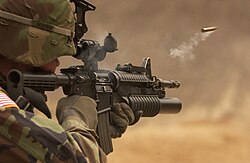
A casing, also called case or the brass, is the part of a cartridge that contains the gunpowder charge, the primer, and the bullet. After a shot is fired, the casing is empty because its gunpowder charge has burned, the primer has been used and the bullet has been propelled. Automatic and semiautomatic firearms, which extract and eject the casing automatically as a part of their operation, sometimes damage the casing in the process of ejection. Brass is a commonly used material, as it is ductile enough to be reformed and reloaded several times. However, some low-quality "plinking" ammunition, as well as some military ammunition (Chiefly from the former Soviet Union and Communist China) is made with steel casings because steel is less expensive than brass. As militaries typically consider small arms cartridge casings to be a disposable, one-time-use affair, the lack of ductility is not a disadvantage for this application.

After a crime committed with a firearm, police attempt to collect cases and bullets used in weapons associated with the crime.

[de:Patronenhülse]]
[fr:Étui (arme)]]
[ja:薬莢]]
[pl:Łuska (nabój)]]
[ru:Оружейная гильза]]
[sl:Tulec (orožje)]]
[fi:Hylsy]]
[sv:Patronhylsa]]